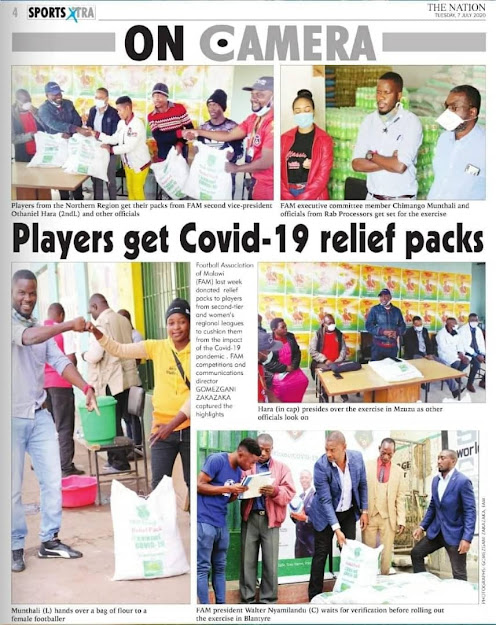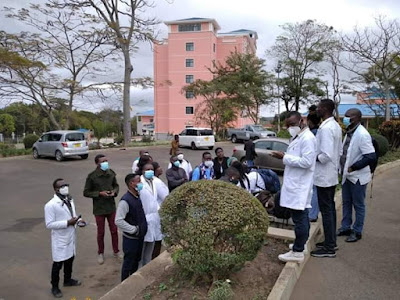Sunday, 19 July 2020
Who is taking care of ARTISTS????
COVID Stories Gallery
 |
| Should we open Schools? |
 |
| Are these COVID deaths? |
 |
| No escaping |

Monday, 6 July 2020
The Social Cost for Managing COVID-19
Analysing the COVID-19
crisis in developing countries like Malawi, it is apparent that managing the
spread of the pandemic comes at a cost. This article aims at highlighting some
of the social costs that as a society we are paying in order to manage
COVID-19. There are so many social costs that we are paying as individuals and
communities. This article will not highlight all the issues; rather it intends
to bring awareness on some of the issues that may be overlooked due to the
overwhelming nature of corona virus disease.
Psychosocial
Trauma for Health Workers
Along with its high infectivity and fatality rates, the 2019 Corona Virus Disease (COVID-19) has
caused universal psychosocial impact by causing mass hysteria, economic burden and financial losses. Of specific interest in Malawi are the Health care workers. In addition to minimal wages, lack of equipment and inadequate training, health workers risk their lives every day taking care of infected patients, witnessing higher rates of death and experiencing breakdowns of protocol and support. These acute stresses could lead to mental health issues, yet therapeutic support is also not sufficient. We hope that our government will recognize these sacrifices and put in place measures that will support the mental wellbeing of health workers.Blame Game between Urban
and Rural Settlers
The origin and the
spread pattern of COVID-19 in Malawi have the background related to foreign
travel usually by the population in urban communities. This has created a
notion where by rural settlers shifting the blame to the urban community. One
interviewee bluntly said ‘the people that travel in and out of the country are
responsible for the spread of COVID-19 in the country’. This line of thinking
has seen some communities refusing to welcome their relatives from Republic of
South Africa due to the fears that there are more COVID-19 cases where they are
coming from. This comes barely weeks after 400 returnees escaped the quarantine
centre creating fears of an outbreak within the urban community. Some of the
returnees complained that the stadium (quarantine centre) had no water, no
toilets and the government was not providing them with food https://www.nyasatimes.com/malawi-at-risk-400-returnees-escape-from-covid-19-test-centre-in-blantyre/
Now that the
campaign period is over, new government has been sworn in, hopes are high that
the new government will prioritize public safety and welfare. Hopes are high
that COVID-19 management will be more effective.
Increased Cases of
Teenage Pregnancies
Managing the spread
of COVID-19 in Malawi comes at a high social cost especially for adolescent
girls. Schools are still closed since 23rd March, 2020. This new
normal has definitely added the burden on parents. For most parents, sending
kids to school is one way of making sure that their children are occupied with
productive learning tasks. Having schools closed means that children stay at home
most of the times, if they are not home parents get more worried.
As the COVID-19
pandemic rages on, the number of women unable to access family planning, facing
unintended pregnancies, gender-based violence and other harmful practices could
skyrocket by millions of cases in the months ahead https://malawi.unfpa.org/en/news/new-unfpa-projections-predict-calamitous-impact-womens-health-covid-19-pandemic-continues-12
COVID-19 will
disrupt efforts to end child marriage. Adolescence is a time of transitions
that foster both challenges and opportunities. Indeed, choices made during
adolescence not only have immediate consequences but also greatly influence the
economic opportunities, health outcomes, and skill sets attained later in life,
and yet it is the same period when social norms create pathways largely defined
by gender. COVID-19 is creating loopholes for high rates of teenage
pregnancies.
Tuesday, 30 June 2020
COVID-19 Overshadows Environmental Arts
Thursday, 25 June 2020
Saturday, 20 June 2020
Cricky hopes for the best after COVID-19
"Put passion first before money. If you have that hunger, you are going to overcome," advises the seemingly hungry Cricky.
Besides his personal life as a martial artist, Cricky Justice is one the country's most talented videographers who has worked with corporate companies and organizations such as Glam and Glory Cosmetics, Conservation Music Malawi and big artists such as Phyzix, Vube, Prince Martin.
He has covered big events such as Lake of Stars, Livingstonia Beach Festival and Its Only Entertainment's (IOE) Ghetto Festivals.
Cricky owns Dazzle Media which was previously operating from a small studio in area 49, Lilongwe.
The studio's small space made it a bit problematic for Cricky to operate freely, let alone attract groups such as music choirs and large families for a photoshoot either on a blue screen inside or outside the studio.
Earlier this year, Cricky moved in into a big studio in area 25 A where business started picking up. Then, the harsh reality struck following the confirmation of Covid 19 cases in Malawi.
"Despite the current pandemic, one of the good things that have happened is moving from a small to a bigger operating space. We had high expectations and we were hoping to reach a certain target.
"We were supposed to have a grand launch but up until now we still haven't formally launched our studios. We are just being cautious and taking precautions," Cricky says.
Fear and uncertainty grips the nation as the Malawi government had also contemplated a possible lockdown which was later challenged in court and blocked with an injunction obtained by the Human Rights Defenders Coalition, HRDC.
HRDC argued that a lockdown would infringe people's rights because most Malawians work in the informal sector and survive on hand to mouth. Worse still, the Malawi government was unclear on how the poor would be cushioned.
For instance, elsewhere in the world, developed nations gave out cash and food stuffs to the underprivileged during lockdowns, something developing nations like Malawi couldn't manage to do.
Though the lockdown was blocked, people still live in fear and business isn't as usual.
Despite live events such as wedding ceremonies, festivals and shows slowly resuming, the initial cancellation has had a far reaching negative effect on creatives, specifically photographers like Cricky who hustle from such events.
"The Covid 19 has greatly affected my hustle. Business has been bad because we are not getting any bookings for shows. The rentals are quite expensive, but I can't do otherwise because I have bigger dreams and I believe, this too, shall come to pass," Cricky explains.
He adds, "Corona virus has happened. We have to adapt and move on. Our economy has to get back on track."
His recent work is 'What is this?' video which talks about the mystery of COVID-19. composed and performed by Zinja and Ed. Follow the link below
https://youtu.be/1gZ9YYgKiIw
Monday, 8 June 2020
Environmentalists Engage Artists on World Environmental Day
Movement for Environmental Action in partnership with Lilongwe Wildlife Trust on 5th June joined the rest of the world in commemorating World Environmental Day.
The two partnered with Conservation Music Malawi artists and Association of Environmental Journalists on commemoration activities.
The activities started with clearing of plastics at Lilongwe Wildlife Center along Lingadzi river and a recorded discussion on Biodiversity on Zodiak Broadcasting Station as well as a live stream performance.
Kelicia Chingeni, Movement for Environmental Action media and advocacy committee member says, “The Wilderness trails along the lingadzi river at Lilongwe Wildlife centre have so much garbage in particular plastic. Plastic is dangerous to both aquatic life and human life.
Full article https://265entmw.live/environmentalists-engage-artists-on-world-environmental-day-activities/






